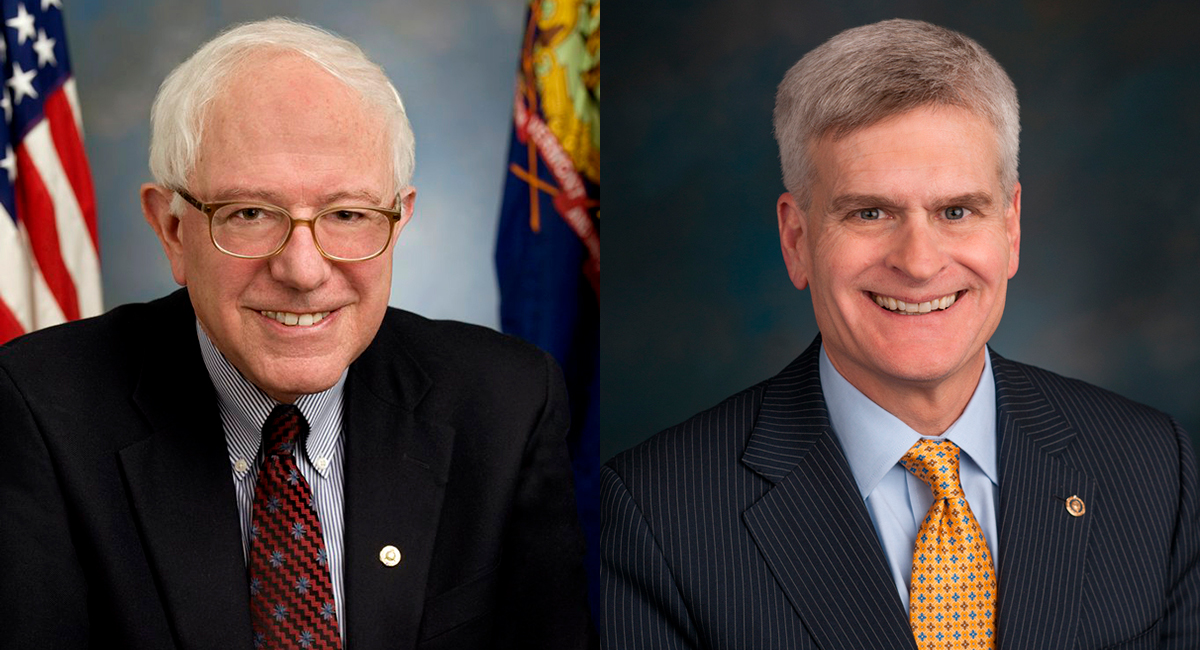Next year the U.S. Senate committee that deals with health policy will be chaired by a Democrat who shares two major goals with the ranking Republican member. Both believe we should have universal health care coverage and both believe it can be done with money already in the system.
Yet their views on how the health care system should function are so profoundly different that there is hardly any overlap.
Right now, Bernie Sanders (D-Vt) is slated to become the chair of the Committee on Health, Education, Labor and Pensions (HELP) and Bill Cassidy (R-La) is expected to be the ranking member. Sanders will need help from Cassidy if anything is to be done in a closely divided Senate.
Because Sanders and Cassidy tend to have amiable natures, some are optimistically predicting a lot of bipartisan cooperation in the HELP committee over the next two years.
But that overlooks how differently the two think about health care.
Sanders’ Views
Most people are vaguely aware that Bernie Sanders advocates Medicare for all. Yet what Sanders has in mind is very different from what the elderly and the disabled are experiencing today.
For example, almost half of all Medicare participants are enrolled in private Medicare Advantage plans. And traditional Medicare routinely contracts with for-profit hospitals and medical facilities. If Sanders had his way, “profit” would be completely expunged from every aspect of the health care system.
That means no doctor, no hospital, no insurer and no participant of any sort would receive an economic reward for making health care less costly, more efficient, more accessible and of higher quality.
Cassidy’s Views
By contrast, Bill Cassidy has long believed that most of our problems in health care exist because the U.S. (along with most of the rest of the developed world) has succeeded in suppressing normal market forces. As a result, none of us ever sees a real price for anything. No patient, no doctor, no employer, and no employee.
Adam Smith taught us that in a well-functioning marketplace producers strive to meet the needs of their customers because it is in their economic self-interest to do so. The more needs they meet, the greater the economic reward they get.
Over the last 250 years economists have produced an enormous body of research showing how well markets actually work. There has been surprisingly little research on how nonmarket systems function, however. Still, there are certain things we know.
If you suppress the price system and insulate providers from economic penalties and rewards, self-interest does not vanish. It’s just redirected. One reason the British and Canadian health care systems perform so poorly is because it is not in anyone’s self-interest to make them work better.
The primary motive for the establishment of the British National Health Service (NHS) in 1948, for example, was to make health available to all on the basis of need, not on the basis of social class or ability to pay. Yet decades later, government investigations (the Black Report and the Acheson Report) found just as much inequality in British health care as there was before the NHS was started.
Without Prices, Patients Must Wait in Line
If you suppress the price system, you inevitably increase the importance of nonmarket factors—principally, waiting. In general, the lower the money price of care, the higher the time price will be.
In the U.S., nonmarket barriers to care are apparently a greater obstacle to primary care than the fees the doctors charge—even for low-income patients. This form of rationing is an even greater problem in Canada (where patients wait an average of 11 weeks to see a specialist) and in Britain (where 6.4 million people are on waiting lists for hospital care).
Several years ago, Sen. Cassidy introduced a bill with Pete Sessions (R-Tx) that would give every American a refundable tax credit for health care. Markets would be deregulated so that meeting people’s needs would be in everyone’s self-interest.
If you combine the average premium with the average deductible faced last year by people in the (Obamacare) exchanges, a family of four (not getting a subsidy) had to pay $25,000 before getting any benefit at all from their health plan. In contrast, the Cassidy bill would allow people to buy insurance that meets their financial and medical needs.
Instead of the Obamacare practice of forcing insurers to be all things to all enrollees, the Cassidy bill would allow plans to become centers of excellence, specializing in such conditions as diabetes and heart disease.
Instead of the Obamacare requirement that insurers receive the same premium for all enrollees, regardless of health condition, Cassidy would allow the kind of risk-adjusted premiums we see in the Medicare Advantage program. This is the foundation for a robust, competitive market for taking care of the sick.
Instead of the Obamacare practice of making health care even more bureaucratic than it was, Cassidy would liberate the market, allowing patients to compare prices. And we know that when providers compete on price, they also compete on quality.
One way to think about all this is to see that Sanders thinks incentives shouldn’t matter in health care. Cassidy accepts the fact that incentives always matter—and that’s why we need to get them right.
In Sen. Cassidy’s world, government would have two functions: (1) to make sure everyone has the financial means to enter the health care system and reap the benefits of market competition; and (2) to serve as a safety net, meeting any needs that the private sector doesn’t meet.
Ironically, in Sen. Sanders’ world there would be no safety net. If the Canadian government doesn’t provide a mammogram or a hip replacement or heart surgery in a timely manner, it is illegal for the private sector to provide those services. In 2016, 63,459 Canadians traveled outside their country for medical care.
Clearly, in order for there to be a meeting of the minds on the HELP committee, there is a lot of ground to cover.












